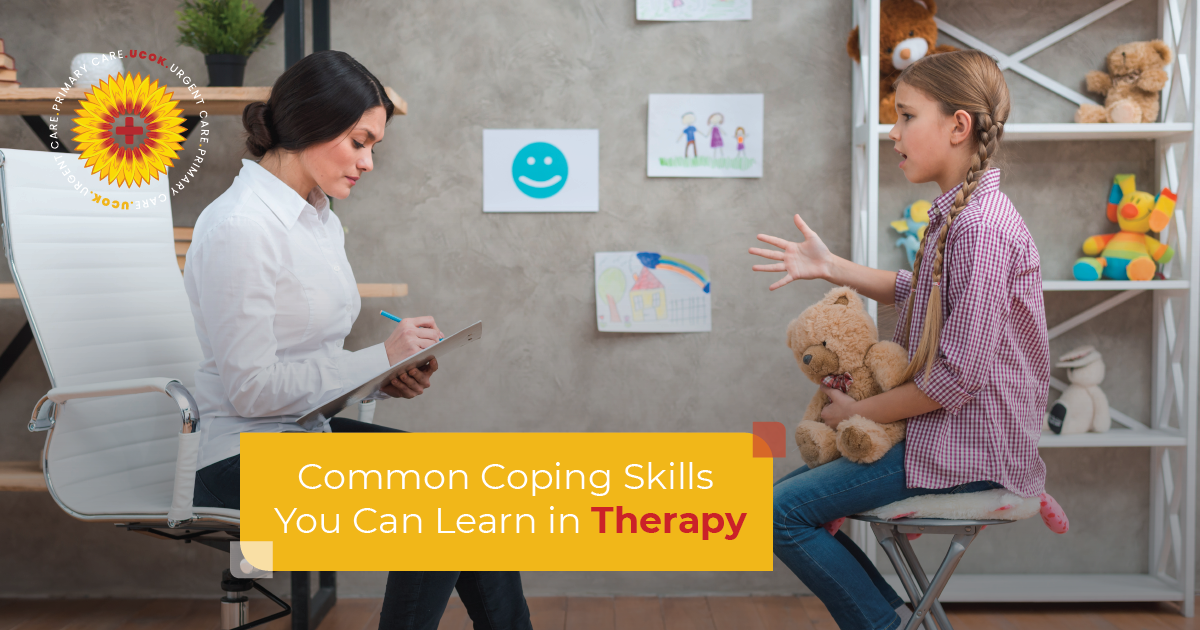Therapy is a safe place to learn ways to feel better when life gets hard. At Urgent Care of Kansas (UCOK) Mental Health Center, you work with professionals who understand both medicine and emotions. With UCOK’s collaborative care approach, you’re never alone. Our team of experts supports you every step of the way.
1. Deep Breathing
When you feel worried or scared, your breath can help. In therapy at Urgent Care of Kansas, you learn to take slow, deep breaths:
- Breathe in through your nose for four counts.
- Hold for two counts.
- Blow out through your mouth for six counts.
Doing this three times can make your body feel calm and centered.
2. Counting Feelings
Big feelings can be hard to name. At UCOK, a mental health specialist might guide you to count where you feel them:
- “Point to where you feel tight.”
- “On a scale from 1 to 5, how big is that feeling?”
This makes your feelings smaller and easier to handle with the support of Urgent Care of Kansas.
3. Talking It Out
Sharing your thoughts helps them float away. In UCOK therapy sessions, you tell your story without fear:
- A caring UCOK counselor listens closely.
- You learn to use “I feel” words.
- You practice saying “I need help” when you need it.
Talking with the Urgent Care of Kansas team helps you know your matter.
4. Drawing It Out
Sometimes words run away. Drawing can catch them:
- Use bright crayons or paints in UCOK’s therapy room.
- Draw shapes for how you feel.
- Share your picture with your UCOK helper.
Art in therapy at Urgent Care of Kansas makes hidden feelings easy to see.
5. Taking a Break
When schoolwork or friends make you tired, a break helps. UCOK encourages small pauses:
- Stand up and stretch in our calming lounge.
- Walk to the window and look outside at our peaceful view.
- Sip a drink of water in our waiting area.
Urgent Care of Kansas teaches that short breaks can keep you strong.
6. Body Moves
Your body holds stress. Gentle moves can set you stress-free:
- Walk around the UCOK hallway.
- Shake your arms and legs in our therapy space.
- Stretch up tall and reach for the sky in our garden.
In Urgent Care of Kansas therapy, you try different moves to find what helps you most.
7. Mindful Moments
Mindfulness is paying close attention to now:
- Feel your feet on the UCOK carpet.
- Notice sounds in the therapy room.
- Smell something nice in our tea corner.
UCOK helpers show you how to notice small things. This practice makes your mind quiet.
8. Positive Self-Talk
Mean thoughts can make you sad. At Urgent Care of Kansas, you learn to speak kindly to yourself:
- Replace “I can’t” with “I will try.”
- Say “I am brave” when you are nervous.
Your UCOK counselor helps you find words that lift you.
9. Journaling
Writing in a book can clear your head:
- Write one or two sentences about your day on UCOK stationery.
- Draw stars beside happy moments.
- Scribble or doodle next to complex parts.
Urgent Care of Kansas Therapists guide you to use your journal as a friend.
10. Building a Support Team
Feeling better takes a team. Urgent Care of Kansas Mental Health Center believes in collaborative care. This means:
- Doctors at UCOK check your body’s health.
- Counselors guide your feelings.
- You share your thoughts.
All three talk and plan together to help you grow stronger.
11. Problem-Solving Steps
Life gives puzzles to solve. In UCOK therapy, you learn simple steps:
- Name the problem. “I feel lonely.”
- Think of ideas. “Call a friend.” “Draw a picture.”
- Pick one idea.
- Try it out.
- Check how it went.
This plan from Urgent Care of Kansas helps you face worries with a clear path.
12. Routine and Rest
Good habits help feelings stay steady. UCOK therapists help you set simple routines:
- Wake up at the same time each day.
- Go to bed after a quiet routine (like reading).
- Eat meals at regular times.
Urgent Care of Kansas shows that routines help your body and mind stay on track.
13. Asking for Help
One considerable skill is asking when you need help. In UCOK therapy, you practice:
- Saying, “I need help.”
- Informing someone if you feel unsafe.
- Call the UCOK helper if you feel very sad.
Learning to reach out to Urgent Care of Kansas makes you brave and strong.
Conclusion
Therapy at Urgent Care of Kansas Mental Health Center is more than talking. It is learning fundamental skills you can use every day. You learn to breathe, draw, chat, and play in ways that help your heart feel lighter. You build a team that cares for your body and your mind. Remember, you deserve help. You deserve to feel calm and safe. With practice and UCOK’s support, you grow stronger and happier each day. Contact us today.
FAQs
Q. Who can I talk to if I feel scared to ask for help?
If you feel nervous, you can start by talking to a parent, teacher, or friend. You can also call your UCOK helper. Telling someone you need support is brave.
Q. What if I try a skill and it doesn’t work?
That’s okay. Helpers at Urgent Care of Kansas know that not every skill works right away. Try another skill or talk to your counselor about what feels best.



No comment